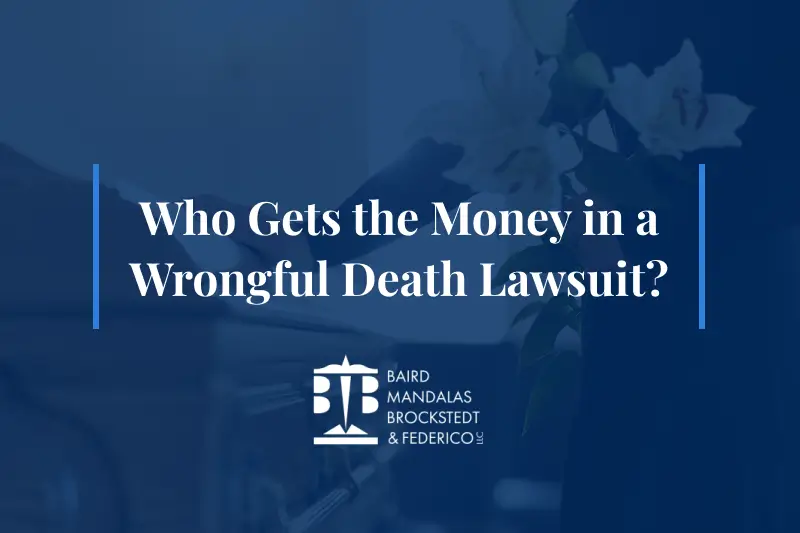
There is nothing more upsetting than the wrongful death of a family member. When the wrongful death results from medical malpractice, it can be particularly devastating for the family.
You may ask, “who gets the money in a wrongful death lawsuit?” We can help you get answers to this question.
If you believe you may have a wrongful death claim, contact the wrongful death lawyers in Maryland at Brockstedt Mandalas Federico today.
What Is Wrongful Death?
Wrongful death, generally speaking, is a civil lawsuit in which damages are sought for causing a person’s death. Wrongful death often results from medical malpractice.
Indeed, misdiagnosis, delayed diagnosis, anesthesia errors, medication mistakes, ER negligence and other types of medical malpractice can all result in wrongful death.
Survival Actions vs. Wrongful Death Lawsuits?
In Maryland, if a patient dies as a result of medical malpractice, a survival action and/or wrongful death lawsuit could, potentially, be filed.
Below, we discuss the differences between a survival action and a wrongful death claim.
Survival Action
In a survival action, the deceased’s estate can recover for damages incurred from the time of the medical malpractice until the time of the decedent’s death.
These damages include the deceased’s conscious pain and suffering, any medical bills incurred and/or funeral and burial expenses.
Essentially, a survival action compensates the decedent’s estate for the injuries suffered before he or she died.
A survival action for medical malpractice need not be filed prior to the death of the decedent.
Wrongful Death Action
Unlike a survival action, which is brought on behalf of the deceased’s estate, a wrongful death action is brought on behalf of the deceased’s legal beneficiaries.
Wrongful death beneficiaries can, potentially, recover for the grief they have experienced and continue to experience as a result of the wrongful death.
Who Is Eligible to File a Wrongful Death Suit in Maryland?
In a wrongful death lawsuit, the beneficiaries entitled to receive compensation typically include the surviving spouse and children of the deceased.
If the deceased was unmarried or had no descendants, the surviving parents may also be eligible to receive compensation.
Siblings, cousins, nieces, nephews, aunts, uncles, and grandparents are considered secondary beneficiaries and are not entitled to recover for wrongful death in Maryland medical malpractice cases.
Unless there are no primary beneficiaries and the secondary beneficiary was “substantially dependent upon the deceased.”
If you have additional questions about the differences between survival actions and wrongful death cases and/or your eligibility to file a wrongful death suit, do not hesitate to reach out to the experienced attorneys at Brockstedt Mandalas Federico. We are here to help you.
How Are Wrongful Death Settlements Paid Out?
At Brockstedt Mandalas Federico, we are frequently asked “how are wrongful death settlements paid out?”
There are two types of damages that a wrongful death beneficiary may recover in Maryland medical malpractice cases; economic and non-economic damages.
Economic Damages.
This category of damages refers to monetary losses, including past and future lost wages.
Non-Economic Damages
Non-economic damages for primary wrongful death beneficiaries in Maryland resulting from medical malpractice may include the beneficiary’s mental anguish, emotional pain and suffering.
As well as his or her loss of society, companionship, comfort, protection, advice, marital care, parental care, counsel, guidance and training.
Contact our knowledgeable lawyers for more details on what wrongful death damages may be available to you.
How to Divide a Wrongful Death Settlement
In a wrongful death lawsuit, compensation, often termed as wrongful death damages, is awarded to the surviving family members of the deceased individual, following a determination of negligence or misconduct by another party.
When dividing a wrongful death settlement, the court primarily considers each family member’s financial dependence on the deceased.
Factors influencing this determination include the age of the deceased, the financial contributions made by each family member, and any existing financial arrangements or obligations.
Courts typically aim to distribute the settlement equitably, taking into account the individual circumstances of each family member and their level of dependency on the deceased.
For example, a child of the deceased individual might receive more compensation than a parent because he or she was financially dependent on the deceased.
Indeed, Maryland’s wrongful death statute states that damages may be awarded to the beneficiaries proportioned to the injury resulting from the wrongful death.
Can a Sibling Sue for Wrongful Death?
As noted above, primary wrongful death beneficiaries in Maryland include spouses, parents and children of the deceased.
Siblings are not considered primary wrongful death beneficiaries and, therefore, are not eligible to recover for wrongful death unless there are no primary beneficiaries and the siblings were “substantially dependent” on the deceased.
What Is the Deadline to File a Wrongful Death Claim?
It is critical that you are aware of the time limit for filing your Maryland wrongful death claim.
If you do not file your claim before the expiration of the applicable statute of limitations, or deadline, you may be precluded from pursuing the case.
According to section 3-904 of the Courts and Judicial Proceedings article of the Maryland Code, wrongful death claims due to medical malpractice must be filed within three years of the death of the injured person.
If you have further questions regarding the time limit for filing a wrongful death claim for medical malpractice, contact our experienced lawyers at Brockstedt Mandalas Federico.

Fight for the Wrongful Death Settlement You Deserve – 100% Free Consultation Available
Now that you know who gets the money in a wrongful death lawsuit, it’s time to take action.
For more information as to how the Baltimore wrongful death lawyers at Brockstedt Mandalas Federico can help you, contact us today for a free consultation.
Our wrongful death lawyers have decades of experience and are ready to fight for you. We have received numerous multi-million dollar settlements and verdicts for our clients.
We handle cases in Columbia, Pikesville, Parkville, Dundalk, Rosedale, Essex, Brooklyn Park, Towson, Delaware, Washington D.C., and many others.
Where You Can Find Our Baltimore Office Location


